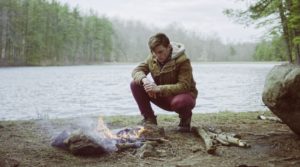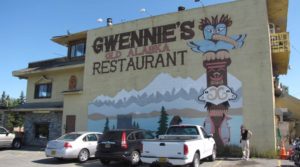I’ve built a life around following my call to travel the world, but it hasn’t always been easy. Some trips took more perseverance, but when I knew I needed to go, I always did. I’m grateful to my younger self. Each journey helped carved the path that brought me to a family I love, work I’m passionate about, and a lifestyle that aligns with my soul.
The trip that first put me on the global adventure track—working as a teaching assistant in American English in Russia at age twenty-one—started out with some obstacles.
At that time, I’d been working with a program called Outward Bound for a few years. It was and is an amazing program, founded by Kurt Hahn on the principles of teaching wilderness skills and character through challenging experiences in the outdoors. I got my start with it as a high school student, when I attended a winter course at the Voyageur Outward Bound School in Ely, Minnesota. A few years later, I would go on to work as a wilderness instructor in a wilderness youth rehabilitation program on the west coast, followed by a position as an assistant instructor with the Hurricane Island Outward School (HIOBS) Florida STEP Program. I’d just been promoted to a full instructor in Florida when I managed to get an invitation through Russian American Exchanges to go work as a teaching assistant in American English, at Veliky Novgorod High School in Novgorod, Russia. The Russian government wanted me to support a juvenile delinquent program there and also start an experiential education outdoor program much like the HIOBS STEP program. It was a big deal, as they told me, since “no American had done this before.” I loved the idea and agreed, planning to head out the following winter. In the meantime, I’d stay in my role as an Outward Bound instructor in Florida.
Then one day in late February my course director, Chris, came to our camp mid-afternoon. He pulled me aside to tell me that my father had just had a stroke and I needed to go home.
When I heard the news I almost passed out. Once I was steady, Chris helped me gather my things. We returned to the office, where I called my mom and learned my father was in the ICU. There was nothing the doctors could do for him. After a quick yet powerful cry, I booked a flight back for early the next day—the soonest I could find. I’d stay the night at Chris’s home and head to the airport in the morning.
Later that night, the phone rang, and I picked up to the sound of my mom crying. Through the sobs, she said, “I’m sorry, Mike. Your father has passed away.” I stayed strong for my mom on the phone and said I would be home tomorrow and that I loved her. She said, “Your father loved you so,” and we hung up clumsily.
I looked at Chris and told him the news. He hugged me for a bit.
I felt numb.
Once Chris let go, he went to his refrigerator and grabbed me a beer. I opened it without a word and stood drinking it in the same spot where he’d hugged me.
Death leaves those living in a strange state, which I remember thinking as I stood there for two beers. I was fine standing and not moving. It was awkward for Chris.
After I reassured him that I was OK he gave me some space and went to bed. The next day I went to the airport, landed in Rochester, New York, and was dropped off at my parents’ house.
The following few days were mostly a blur, yet one pivotal experience still stands out. It cemented my drive to see the world and live my life to the fullest.
During the wake for my father, we had a modest get-together at my mother’s house. Being late February in western New York, it was cold. A wet, overcast, icy, snowless, gray day. A day that fit my mood and everyone else’s in the house.
My father’s two best friends since childhood pulled me aside. In their long drawl they asked me, “So are you going to stay around here and help your mother out and keep an eye on her?”
Without hesitation and from the depths of a place inside me that I had rarely experienced yet, an answer came forth like a train. It was neither emotional nor cold-hearted. Just crystal clear. “My mother has her life to live, and I too have mine to experience.” I was certain of this, and I also knew my experiencing life meant I would travel far away from home. Of that, I was calmly, comfortingly certain.
More than ever, I was dedicated to going to Russia. But getting there was going to take a lot of work. I still had to raise the money to get there, which we figured was $3,500.
I began to utilize my strengths of self-promotion and my contacts. A good friend’s parents helped me craft letters to service organizations like the Kiwanis and Odd Fellows, and as a result I went around the county speaking about the honor it was to be selected to work in such a program in Russia.
I knew speaking at the service organizations wouldn’t make enough money, so I also had two keg parties in my hometown, where I served donated or cheap food, booze, and beer, charging “five bucks a cup.” I had raffles and my friends passed a hat amongst the crowd.
The parties where a hit and are still spoken of today. It was safe to say that no one in my town ever knew someone that went or even wanted to go to Russia, and they gathered together to help make it happen. Imagine the end of It’s a Wonderful Life, but with double the people and George Bailey charging everyone a few bucks to come sing around the Christmas tree. I was really moved. In my own George Bailey moment, my community came out to support me and for that I have always thought of myself as “rich.”
With the money from my speaking engagements, the keg parties, and some odd jobs around town, I raised enough to go. I was (and am) very grateful to all those who helped me during that time.
Once my six-month visa was in order, my flights booked, and my cigars packed, I left, landing in Saint Petersburg during the country’s New Year’s celebrations. I was drunk with jet lag. After deplaning and going through customs I walked down a long corridor with floor-to-ceiling plate glass windows and was greeted by the teacher I would be working with and her two brothers. Her name was Olga Victorovnia, and she was pleasant, intelligent, and gracious.
My time in Russia was filled with adventure, love, and growth. My hosts for the next six months were Boris and Gallena, two grandparents that spoke no English. They were full of kindness, love, and fun, and I learned so much from them. I learned that language isn’t a requirement to get to know someone. I realized I could connect soul to soul, with or without words.
I realized I could also do more mundane things without words, too, as I developed what I came to call the “Harpo Marx Principal of getting what I need.” As the mute brother of the Marx Brothers comedy trio, Harpo would communicate by over-exaggerating his body language and whistling. And I accidently adopted this same strategy while buying bread.
Buying bread in Russia at that time involved speaking and interacting with a few people, including one who stood behind the counter and handed you the type of bread you wanted. But I only knew the general word for bread in Russian (“clep”), not the different types. So when the worker behind the counter said, “Shtow?”—asking, what did I want?—I started whistling and pointing to one of the breads. As they got closer, I would whistle more excitedly. Then once they had their hand on the bread, I would whistle like a bird. This drew quite the attention and delight from everyone.
In time, when I came to the store all the employees would gather around and watch and listen. It was fun and got the job done. And what I learned was simply this: using body language and tone of voice, or in this case a fun whistle, is important when you don’t have a shared language between you. But we connected just the same.
Russia was my first time traveling in a foreign country, and I became more resourceful in my time living and working there. The experience helped me “break the seal” on my path of global adventure, and gave me new confidence I could continue to explore the world. I also learned to use, develop, and uncover my skills and attributes to connect with people. All of which still pays dividends today. It’s an ongoing set of lessons and I’m grateful.
The experience of leaving the known and stepping into the unknown takes work, courage, and resourcefulness. It’s also deeply rewarding.
What can you today to step into the unknown?




